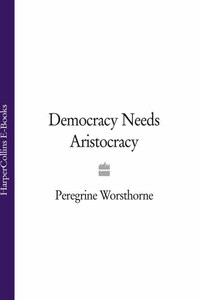Not only does every country have the aristocracy it deserves, but so does every era, including the democratic era. In this essay the term is used in two senses: first, to describe families whose power and authority, high prestige and assured dignity, depended upon titles of nobility dating back, in some cases, to feudal times; and, second, to describe families whose power and authority depend not so much on the distinction of ancient lineage as on what the distinguished American historian John Lukacs* calls ‘distinctions derived from the consanguinity of their families with high civic reputation’; in other words, on a record of public service rather than on blood. Of the first it could be said that they were powerful and authoritative because they were noble; of the second that they were noble because they were powerful and influential.
Mr Lukacs suggests that a better term to describe this second meaning – families who are noble because they are powerful and influential, rather than the other way around – would be ‘patrician’ rather than aristocratic. They have something in common he writes, ‘with the old patrician societies of modern Europe, nearer to the middle of the continent, with a social and civic order incarnated by the great merchant families in cities such as Basel, Geneva, Amsterdam, Hamburg, or with the grand bourgeois (often Protestant) families in France … little in common with Proust’s world of the Guermantes; many things in common with the world of Buddenbrooks (which Thomas Mann described in 1901) … solidly bourgeois (in the best sense of that often used word) and not glitteringly feudal.’ Mr Lukacs’s point is well taken. In the nineteenth and twentieth centuries, the description ‘patrician’ catches the flavour of the English ruling class rather better than the word ‘aristocratic’, covering, as it does, both Peel and Salisbury, Disraeli and Gladstone, Harold Macmillan and Hugh Gaitskell, even, just, both Tony Blair and Michael Howard. Nevertheless, out of habit, I have decided to stick to aristocratic and aristocracy and to leave it to the reader to make the necessary adjustment according to the context.
In any case, central to both meanings is the idea of certain families, joined together by the invisible bonds of memory, as bearers of important moral and social values and political traditions that carry authority because they have been demonstrated, to the satisfaction of all classes, to have served the public interest over many generations.
An aristocracy must also have another intangible source of power and authority – transcending all the others – that comes from longevity; from having been around long enough to have become an integral part of the nation’s history and mythology. So without that time-honoured place in a nation’s history and mythology an aristocracy ceases to be an aristocracy, and reverts back to being an ordinary power elite, whether in the form of plutocracy, oligarchy, a military junta, or meritocracy. In other words, the authority of an aristocracy, like that of a theocracy, depends on the power of faith: the public’s faith in it and the aristocracy’s faith in itself. It profits an aristocracy little, therefore, to retain only its wealth and power because without that intangible element of faith – beyond the range of political scientists to identify or quantify – it is no more than sounding brass and tinkling cymbals.
In this essay I shall try to argue that because of the British aristocracy’s uniquely successful past, residual elements of the old faith still survive, along with even larger elements of its old wealth and influence. Legal status is also a factor. At the time of writing, the aristocracy still has legal status. Titles are officially bestowed and recognized, and a certain number of hereditary peers are still allowed to take a seat in the House of Lords, albeit only if elected by their fellow peers. But legal status could be more of a liability than an asset because, as John Stuart Mill famously remarked, ‘the best way to discredit an idea is to give it a privileged, legal status’.
Unquestionably this causes resentment, and in some ways, therefore, the French, who got rid of the privileged status of their aristocracy in the eighteenth century by cutting off their heads, and the Americans, who never had such an aristocracy in the first place, are now less upset by the idea of aristocracy than the British. So much is readily admitted in this essay. In today’s climate a de jure privileged aristocracy with titles of nobility and places in parliament may be an enemy of de facto hereditary aristocracy, which merges so imperceptibly into the ranks of meritocracy as not to present any visible target on which doctrinal egalitarians can train their guns. So it could well be that the idea of aristocracy in Britain would be strengthened rather than weakened by the removal of their legal privileges.














